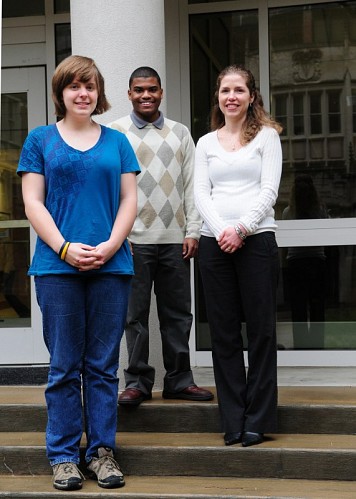
Report after report, it seems, warns that the United States is falling behind other countries in science and technology. Where will the scientists of the future come from?
Some of them will come from the School for Science and Math at Vanderbilt.
Launched in 2007 as a project of the Vanderbilt Center for Science Outreach, the school is a joint venture between Vanderbilt University Medical Center and Metropolitan Nashville Public Schools.
Students receive instruction in the classroom and laboratory from Vanderbilt scientists one day a week. The rest of the week they attend their regular high schools. Seniors also complete a summer research project at Vanderbilt.
This spring the first cohort of students to have attended a full four years of course work at the school will graduate. They’re a distinguished – and hardworking — group.
Take 17-year-old Katie Roland, for example.
To participate in the program, she had to make up a day of classes at her public magnet school, Hume-Fogg, every week. “It was a lot more work,” she says. “But it was so interesting it didn’t matter. It was a fascinating way to spend my extra time.”
In her junior year, she was matched with David McCauley, Ph.D., professor of Biological Sciences, to begin her senior research project.
Her study, entitled “Genetic diversity among mitochondrial genes of Daucus carota,” a wild form of the cultivated carrot, contributed to the growing body of knowledge about how genes are transmitted among plants. It has particular relevance to the development of genetically modified plants like rice and corn that are resistant to drought, for example.
Roland’s study also earned semifinalist honors in two national research competitions for high school students, Intel Science Talent Search 2011 and the 2010 Siemens Competition in Math, Science & Technology. Four other students at the school also were semifinalists in the two contests.
Research may be in Roland’s blood. Her maternal grandfather is Harold L. Moses, M.D., a renowned cancer researcher at Vanderbilt. But while Roland is certain she is “going to college to become a research scientist,” she adds quickly, “I’m not sure I’d have decided that if I hadn’t had this program.”
The School for Science and Math at Vanderbilt is supported in part by a National Institutes of Health NCRR Science Education Partnership Award, by Vanderbilt University Medical Center and by the Nashville Alliance for Public Education.